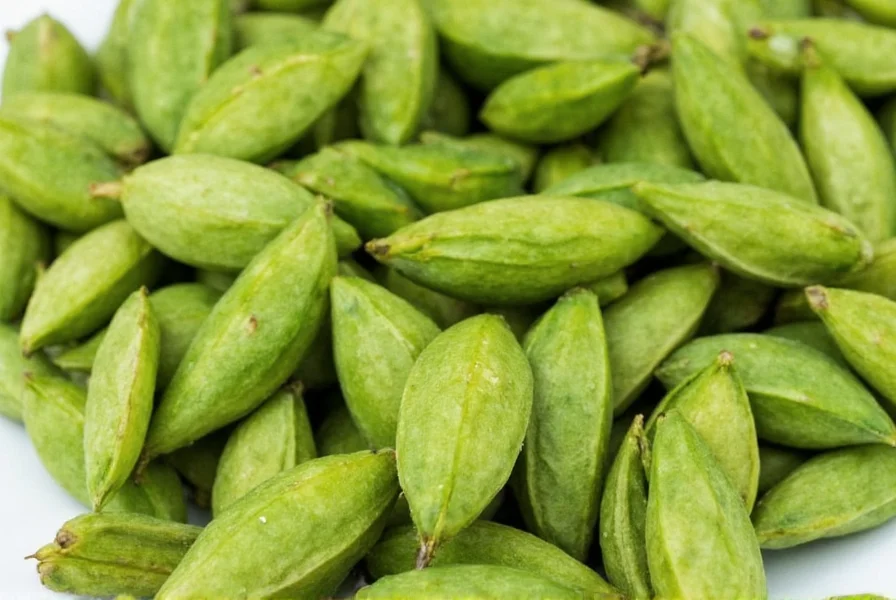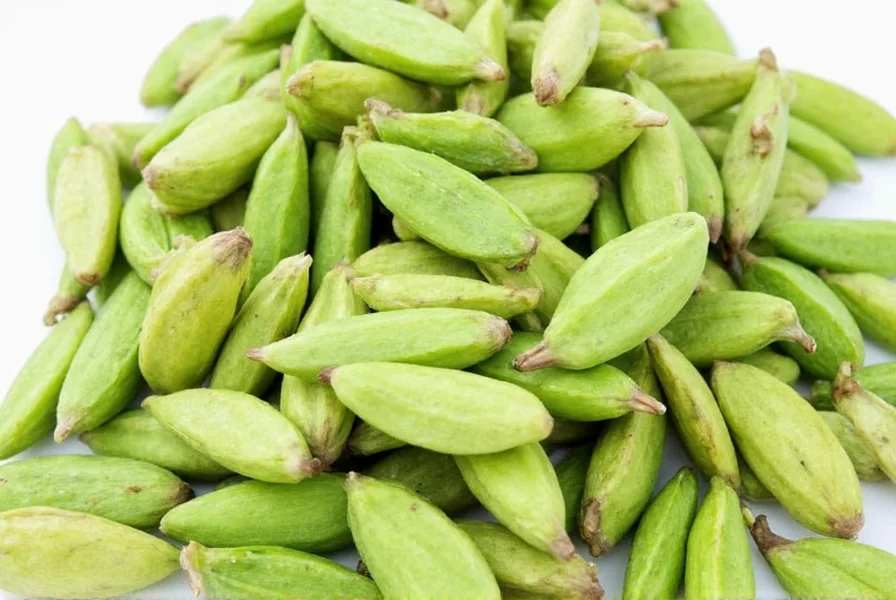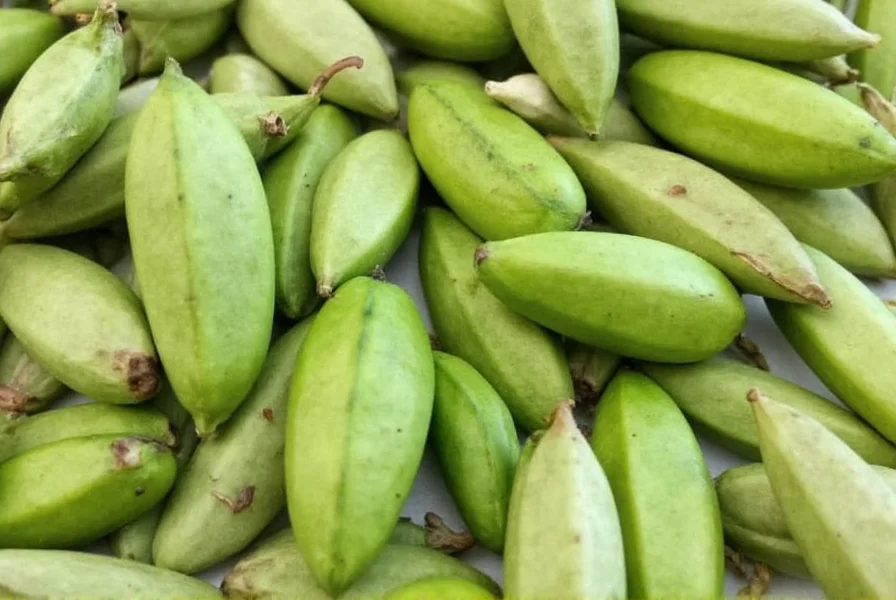Understanding Green Cardamom Pods: Nature's Aromatic Treasure
Green cardamom pods represent one of the world's most ancient and revered spices, with historical use dating back to Ayurvedic medicine and traditional Middle Eastern cuisine. These delicate pods grow on perennial herbaceous plants in the ginger family (Zingiberaceae), thriving in tropical climates with partial shade. The pods measure approximately 1-2 centimeters in length and develop their characteristic pale green color when harvested before full maturity.
What makes green cardamom pods special is their complex chemical composition. Each pod contains 8-16 tiny black seeds rich in volatile oils that create their signature aroma. When evaluating quality, look for pods that feel heavy for their size with a vibrant green hue and intact triangular shape. High-quality green cardamom pods should spring back when gently squeezed, indicating freshness and optimal essential oil content.
Green Cardamom vs. Black Cardamom: Key Differences
| Characteristic | Green Cardamom Pods | Black Cardamom |
|---|---|---|
| Botanical Name | Elettaria cardamomum | Amomum subulatum |
| Flavor Profile | Floral, citrusy, sweet with eucalyptus notes | Smoky, camphorous, earthy |
| Processing Method | Air-dried without heat | Smoke-dried over open flames |
| Primary Culinary Use | Baked goods, rice dishes, desserts, beverages | Hearty stews, meat dishes, certain Indian curries |
| Storage Life | 6-12 months when properly stored | 12-18 months due to smoke preservation |
The distinction between green and black cardamom often confuses home cooks. While green cardamom pods come from the Elettaria cardamomum plant and are air-dried, black cardamom originates from different species (primarily Amomum subulatum) and undergoes smoke-drying. This processing method gives black cardamom its distinctive smoky aroma, making it unsuitable as a direct substitute in most recipes calling for green cardamom pods. Understanding these differences helps cooks select the appropriate variety for specific culinary applications.
Maximizing Flavor: How to Use Green Cardamom Pods
Professional chefs employ several techniques to extract maximum flavor from green cardamom pods. For slow-cooked dishes like biryanis or stews, add whole pods early in the cooking process to allow flavors to infuse gradually. When making baked goods or quick preparations, lightly crush the pods with a mortar and pestle to release the seeds' essential oils before incorporating them into your recipe.
One expert technique involves separating the seeds from the pods for different applications. The outer pod contributes subtle floral notes when used whole in liquid-based recipes, while the inner seeds provide more intense flavor when ground. For beverages like chai or Scandinavian cardamom buns, using both components creates layered complexity. Remember that one green cardamom pod typically contains enough seeds to equal approximately 1/6 teaspoon of ground cardamom.

Proper Storage Techniques for Longevity
Maintaining the freshness of green cardamom pods requires careful storage. Exposure to light, heat, and moisture rapidly degrades their essential oils. Store pods in an airtight container made of dark glass or opaque material, kept in a cool, dark pantry location away from heat sources. Properly stored green cardamom pods retain optimal flavor for 6-12 months, significantly longer than pre-ground cardamom which loses potency within weeks.
For extended storage, consider freezing your green cardamom pods. Place them in a vacuum-sealed bag or airtight container with minimal air space, then store in the freezer. Frozen pods maintain quality for up to two years. When needed, remove only the quantity required and return the remainder to freezing immediately to prevent condensation. Never store cardamom pods in the refrigerator where temperature fluctuations cause moisture buildup.
Health Benefits Supported by Research
Green cardamom pods contain numerous bioactive compounds with potential health benefits. Scientific studies have identified antioxidant, anti-inflammatory, and antimicrobial properties in cardamom's essential oils. Research published in the Journal of Agricultural and Food Chemistry demonstrates that cardamom compounds may help reduce oxidative stress markers in the body.
Traditional medicine systems have long used green cardamom pods for digestive support. Modern research suggests compounds in cardamom may help relax gastrointestinal muscles and reduce symptoms of indigestion. The spice also shows promise in preliminary studies for supporting respiratory health, with compounds that may help clear airways and reduce inflammation in the respiratory tract.
Selecting Premium Quality Green Cardamom Pods
When purchasing green cardamom pods, several quality indicators help identify superior products. Look for pods with a uniform pale green color without yellowing or browning, which indicates age or improper storage. High-quality pods feel plump and slightly springy when gently squeezed between fingers. Avoid pods that feel brittle or crumble easily, as this suggests excessive drying or age.
The aroma provides the most reliable freshness indicator. Fresh green cardamom pods release an immediate citrusy, floral fragrance when crushed slightly between your fingers. Pods with little to no aroma have likely lost their essential oils and won't deliver optimal flavor. For maximum freshness, purchase from specialty spice merchants who maintain high inventory turnover rather than general grocery stores where spices may sit on shelves for extended periods.

Practical Applications Across Global Cuisines
Green cardamom pods feature prominently in diverse culinary traditions worldwide. In Scandinavian baking, they're essential for traditional breads like Finnish pulla and Swedish kardemummabullar. Indian cuisine uses them in biryanis, kormas, and masala chai, while Middle Eastern cooking incorporates them into rice dishes and meat preparations. The spice also appears in surprising applications like Turkish coffee and certain Scandinavian liqueurs.
Chef's tip: When using green cardamom pods in liquid-based recipes, add them early to allow flavors to infuse gradually. For dry applications like baking, lightly crush the pods first to release the seeds' essential oils. Remember to remove whole pods before serving most dishes, though they're edible if properly prepared. One green cardamom pod typically contains enough seeds to equal approximately 1/6 teaspoon of ground cardamom, providing a useful conversion for recipe adjustments.
Frequently Asked Questions About Green Cardamom Pods
Can I substitute ground cardamom for green cardamom pods?
Yes, but with flavor considerations. One green cardamom pod equals approximately 1/6 teaspoon of ground cardamom. However, whole pods provide a more complex, floral flavor profile compared to pre-ground versions, which lose potency quickly. For best results, lightly crush the pods to release seeds when substituting.
How can I tell if my green cardamom pods have gone bad?
Stale green cardamom pods lose their vibrant green color, becoming yellowish or brown. They'll feel brittle rather than slightly springy when squeezed, and most importantly, won't release a strong citrusy, floral aroma when crushed. Fresh pods should have a pronounced fragrance immediately upon cracking.
Should I remove green cardamom pods before serving dishes?
Yes, in most cases you should remove whole green cardamom pods before serving. While edible, the tough outer pods can be unpleasant to bite into. However, in some traditional preparations like Indian chai, the pods remain in the beverage as their flavor continues to develop with prolonged steeping.
What's the best way to grind green cardamom pods?
For optimal flavor, first remove seeds from the pods by gently crushing them with the flat side of a knife or in a mortar. Then grind only the black seeds, not the fibrous outer pods, using a dedicated spice grinder or mortar and pestle. Avoid pre-grinding cardamom as it loses flavor rapidly; prepare small quantities as needed for immediate use.
Are green cardamom pods safe for daily consumption?
Green cardamom pods are generally safe for culinary use in typical food amounts. Most people can safely consume 1-3 pods daily as part of regular cooking. However, extremely high consumption (more than 10-15 pods daily) might cause digestive discomfort in sensitive individuals. Those with gallstone issues should consult a healthcare provider before regular medicinal use.











 浙公网安备
33010002000092号
浙公网安备
33010002000092号 浙B2-20120091-4
浙B2-20120091-4